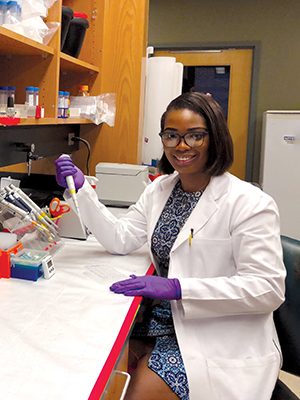Scientists of Tomorrow: Zainab M. Shonibare
Story by Curran Umphrey | Photo submitted by Zainab M. Shonibare
In Fall 2017, Zainab M. Shonibare moved more than 5,800 miles across the world from her home country of Nigeria to begin her graduate studies in South Carolina. There, she joined the laboratory of Mythreye Karthikeyan, Ph.D., where she researched metastasis in gynecologic cancers.
Just two years later, Karthikeyan accepted a position at UAB as an associate professor in the Division of Molecular & Cellular Pathology and invited Shonibare, along with four others, to join her.
“I did some research before making this decision, and I realized I would be at the National Cancer Institute-designated UAB O’Neal Comprehensive Cancer Center, one of the nation’s leaders in cancer research,” Shonibare said. “It was just a no-brainer. You shouldn’t say no to that.”
Now an O’Neal Cancer Center researcher and UAB doctoral candidate, Shonibare is studying how the alteration of signals from bone morphogenetic proteins, or BMPs, impacts cancer cells’ ability to spread to other regions of the body. These proteins help control cellular responses such as cell differentiation, cell growth and cell death.
To resist death signals from BMPs, cancer cells make copies of and express a gene called Sox2, which is the same gene that often determines sex in males. Sox2 has been considered “undruggable,” meaning it is difficult to design a drug that could target it directly. However, Shonibare and her peers discovered that BMP9 can reduce Sox2 expression, which could prevent the spread of cancer cells within the body. Through the lab’s prior research, they also know that BMP9 levels are lower in ovarian cancer cells compared to noncancerous cells.
As a basic science researcher, Shonibare’s mission is to figure out specifically how BMP9, which exists outside of the cell, can reduce Sox2 expression within the cell. The answer to this question could lead to a novel drug discovery.
“Think of BMP9 like this: There is somebody outside the gates of your apartment, and there is no physical evidence of that person entering the gates. Yet, that person is able to hurt somebody inside of a bedroom,” Shonibare said. “It’s a mystery, and we need to find out how this is happening.”
The goal of Shonibare’s project is to translate these findings into clinical therapeutic strategies that will benefit patients and improve survivor outcomes not only in the United States, but also around the world.
“The prevalence of gynecologic cancers in African countries is much lower than in Western countries, where there is access to better diagnostic tools and more sophisticated research strategies. Ironically, in Africa, 73 out of 100 women diagnosed with ovarian cancer die from the disease,” Shonibare said. “I believe that my home country and the entire world deserve and would benefit from adequate research in gynecologic cancers.”





